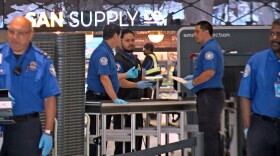It’s not your typical opera setting. The auditorium is small. The audience didn’t pay a dime to get in. And the performers have limited stage experience — except one.
It was a rare opportunity to see Plácido Domingo, teacher, leading a master class at UCLA this past weekend with four young singers including Eric Levintow, a 25-year-old tenor from San Francisco.
After listening to Levintow performing the aria “Una Furtiva Lagrima,” from Gaetano Donizetti’s “L’Elisir d’Amore,” Domingo tells him to sing it again. This time he gently interrupts Levintow throughout to discuss character motivation and phrasing. He corrects breathing and posture.
Domingo joined UCLA as an adjunct professor in 1994. The master class performance was part of a daylong event honoring his dedication to music education and the arts in Los Angeles — a celebration that included awarding him the university’s highest honor: the UCLA Medal.
“When I first came to Los Angeles 50 years ago, I never could’ve imagined that this city would someday become a second home,” he said in prepared remarks. “The world was just beginning to open up for me.”
Domingo first set foot on a Los Angeles opera stage in 1967, playing the king Don Rodrigo in composer Alberto Ginastera’s jagged, modern opera of the same name.
“It was my first visit to Los Angeles and when you’re 26 years [old] and you’re coming to Hollywood, it’s very exciting,” he said.
Following the medal ceremony, master class and a private reception, Domingo settled into a backstage green room with his wife and opera stage director Marta close by, just as she has been for the past 55 years.
“And then I was involved in really forming LA Opera,” said Domingo. “I [got] the idea that I should move the people to have an opera company. And we did, and here we are.”
Before Domingo, opera in Los Angeles battled for a place in the spotlight. Performances tended to be upstaged by the more established Los Angeles Philharmonic. There was an over-reliance on visiting opera companies. But LA Opera CEO Christopher Koelsch said Domingo tapped into a hunger — and rallied a group of local and loyal benefactors who’ve helped grow and sustain LA Opera for over 30 years.
“I don’t think it’s going too far to say that opera in Los Angeles would not exist without his leadership,” Koelsch said. “I think in the end he’s an evangelist for the art form. I think he saw an incredible opportunity here, a growing density of culture.”

While LA Opera took flight in the mid-1980s, Domingo was at his zenith, in demand as both a performer and a conductor across the globe.
But as he cut back on performing, his LA Opera duties expanded, from artistic consultant to general director following the passing of founding director Peter Hemmings 15 years ago.
“I would love very much that the company can grow at the turn of the decade,” said Domingo. “Where we are now about six or seven productions [per season], my dream would be that we can have like eight productions.”
LA Opera dialed back on main stage productions during the global economic crisis. But under Domingo’s leadership, the company also launched a program to showcase new, more experimental works at smaller venues through its Off Grand initiative.
“There are still things he wants to accomplish and I have so much respect for that idea of a quest,” Koelsch said. “That’s an incredible energy to organize an opera house around. It pushes the entire entity to try and reach that goal.”
This weekend, Domingo wraps up a monthlong engagement at LA Opera playing, as he did 50 years ago, a king. This time however it’s the aging king who descends into madness at the heart of Giuseppe Verdi’s “Nabucco.”
It’s an intensely physical role that has the 76-year-old tenor falling to his knees, getting yanked around by henchmen and delivering one aria while sprawled on his belly.
“One is tempted to say that this guy has a bargain with some really important supernatural beings,” laughs Peter Kazaras, the director of Opera UCLA who first saw Domingo on stage in the late 1960s.
“Most people at his age, they physically cannot do it. The apparatus has given out,” Kazaras said. “He’s like a pitcher who is still pitching at the age of 50. So it seems clear that he’ll go for as long as he wants to go.”
“Music is my life, opera is my life,” Domingo said softly, his voice quavering a bit during his comments at UCLA. “And I feel blessed to have been given a gift that I can share with other people, and that I can use to bring joy into their lives.”
Despite some recent health setbacks, Domingo continues to perform and conduct around the world, though his main-stage opera performances are getting further and further apart.
But Domingo confirms that he intends to perform in the yet to be announced 2018-2019 LA Opera season.
“Surely if I am in a good voice and if I am in good health. And if the planet is still here, then yes,” he laughed.
Plácido Domingo closes out the LA Opera season this weekend with a 50th anniversary tribute concert and one final performance of Verdi’s “Nabucco.”





